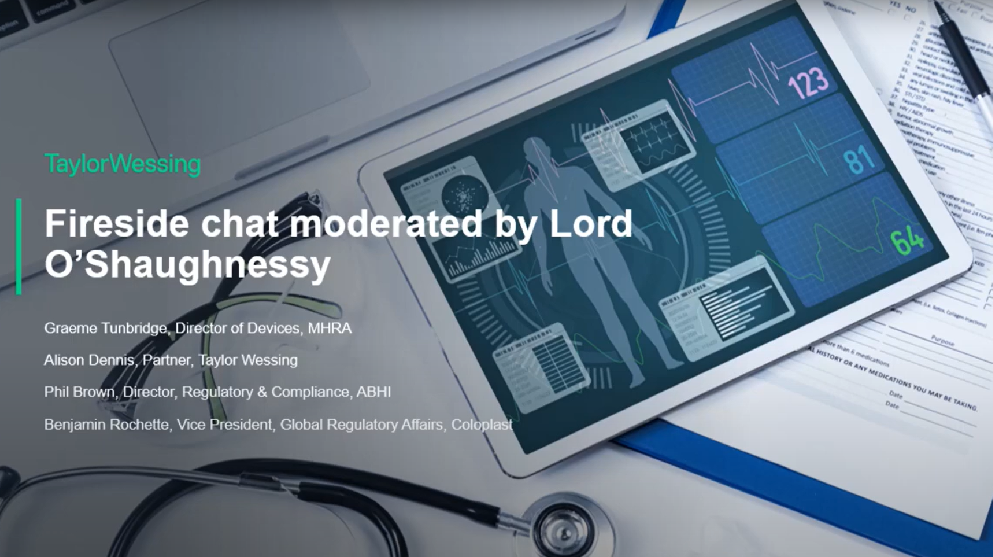- Home
- News & insights
- Insights
- Transatlantic perspe…
29 September 2021 | 00:25:16
Transatlantic perspectives on HealthTech regulation
Earlier this month we hosted a Transatlantic perspectives on HealthTech regulation seminar in partnership with ABHI and chaired by Lord O'Shaughnessy. The event highlighted new UK opportunities following the Brexit departure and what we can learn from other jurisdictions.
The event began with Partner Alison Dennis covering the key milestones in the UK regulatory system and how we can look to the future for further changes and improvements. Alison discussed oversight and pre-market communication from regulators, and how this can benefit companies and give them more clarity on the market. She also spoke of post market reviews which are becoming more focused on patient experience and the need for transparency within the regulatory sector to allow greater public access to medical devices as healthcare moves into a more digital approach.
Benjamin Rochette, the Vice President of Global Regulatory Affairs of Coloplast, then took us through the US regulatory landscape. Benjamin covered the risk based approach, which the FDA uses, highlighting the three different classes and their requirements for approval. This includes an explanation of 510(k), PMA, De Novo pathways as well as HDE and the Breakthrough Device Program. He also discussed the ability to have pre-market communication with the FDA in both 513(g) and Q-submissions and how this allows companies greater insight into whether their product will be approved and what they need to do if not.
Graeme Tunbridge, Director of Devices at MHRA, and Phil Brown, Director of Regulatory & Compliance at ABHI, then joined us for a fireside chat covering some of the central themes in HealthTech such as what we can learn from other jurisdictions, the movement towards global standards and the benefits and challenges of mutual recognition. Other topics included how data and technology can be used to improve the current regulatory process and how the UK can be part of this innovative process.
Key insights
- The opportunity for innovation: following on from Brexit, the UK now has the opportunity to develop their regulatory system in new ways. The current regulation is a patchwork of directives and these can now be amended to offer a more innovative and approachable interface. This includes the selection of products for regulation and their risk class identification.
- Post market review: the Cumberlege review highlighted the need for a focus on patient experience. In France GPs have to report any issues with medical devices which allows for ongoing monitoring. This is something which the MHRA could utilise to improve patient experience.
- Risk classification in the US: the requirements for regulatory approval in the US are split into three risk classes each with differing obligations. Class I is design-based and so prior inspection of premises or clinical data is not needed. Class III in contrast will require inspection and clinical data must often be from within the US.
- US routes to regulatory approval: The FDA has applications which can be used to speed up approval. De Novo applications are used to explain why a product should not be a class III product and so would not be under as strict requirements. HDE or the Breakthrough Device Program can help support niche products or specific therapies that will have a significant impact on the market to get authorisation. These applications allow for more flexibility for products which are unfairly classed or which will make an impact.
- Pre-market communication: much can be learned from 513(g) and Q-submissions in the US which allow the FDA to communicate with manufacturers before their applications are submitted. They can give indications of whether approval will be granted and if not, what they could do to gain such approval. The lack of pre-market communication in Europe is something manufacturers are often frustrated by and so offering a similar service could be a huge advantage to the MHRA.
- Transparency: manufacturers are looking for greater transparency in both the cost of applications and the time which they will take. Consumers on the other hand are looking for greater transparency of how their data is being used and for more information so they can understand the consents they are giving.
- Mutual recognition: the data which is prepared for authorisation worldwide is 80-90% compatible and so it seems a waste that new applications must be made in different jurisdictions. Allowing mutual recognition of authorisation would save time and money for many regulators.


